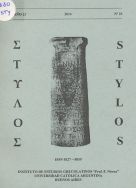Los nombres parlantes en las traducciones de Plauto al español: el caso de Persa
Keywords:
Roman comedy, Plautus, Speaking names, TranslationAbstract
As early as the fourth century, Donatus (ad Ter. Ad. v. 26.) refers to the relationship between proper names in comedy and features of characters. In the last century, many scholars have focused on analyzing such a relationship and the central role of speaking names in Plautine humor.
In this regard, they constitute an extremely important element of the plays and therefore they are central to the translator’s work. However, this problem is often overlooked in translations to Spanish, since the names are not mostly translated, but they are adapted to a Spanish form of the Latin word.
This paper proposes to study how speaking names are rendered in different translations of Persa, the criteria adopted and its implications for translation as a product.
Downloads
References
EDICIONES
PLAUTE, Comédies. Ed. A. Ernout, Paris, 1932-61
T. MACCI PLAUTI, Comoediae. Ed. W. M. Lindsay, Oxford, 1959
P. TERENTI. Comoediae. Cum scholiis Aeli Donati et Eugraphi Commentarius edidit R. Klotz, volumen alterum Adelphos Hecyram
Phormionem continens, Lipsiae, 1838.
M. T. CICERO, De Oratore. Ed. A. S. Wilkins, Oxford, 1981
TRADUCCIONES
PLAUTO, Comedias. Edición y traducción de José Román Bravo (1994), Madrid.
PLAUTO, Comedias. Los prisioneros; El sorteo de Cásina; El Persa; Pséudolo o Requetementirosillo. Edicción de Carmen González Vázquez
(2003), Madrid.
PLAUTO, Comedias. Vol. II. Introducciones, traducción y notas de Mercedes González-Haba (1992), Madrid.
PLAUTO, Comedias. Introducción, traducción y notas de Germán Viveros
(1986), México D. F.
ESTUDIOS CRÍTICOS
DUPONT, F. – LETESSIER, P. (2011) Le Théâtre Romain, Paris.
FAURE-RIBREAU, M. (2012) Pour la beauté du jeu, Paris.
GONZÁLEZ VÁZQUEZ, C. (2004) Diccionario de Teatro, Madrid.
LÓPEZ LÓPEZ, M. (1991) Los personajes de la comedia plautina: nombre y función, Lleida.
LÓPEZ LÓPEZ, M. (2003) “Interpretario nominum y diversificación del concepto de ratio en Plauto”, RELat 3, pp. 29-44.
PRICCO, A. (2012) “Ars retórica/ars teatral y el decorum como factor de escritura: una traducción argentina de Miles Gloriosus para la escena”.
En López, A. – Pociña, A. – Silva, M. de F. (coords.) De ayer a hoy.
Influencias clásicas en la literatura. Coimbra.
Downloads
Published
How to Cite
Issue
Section
License






